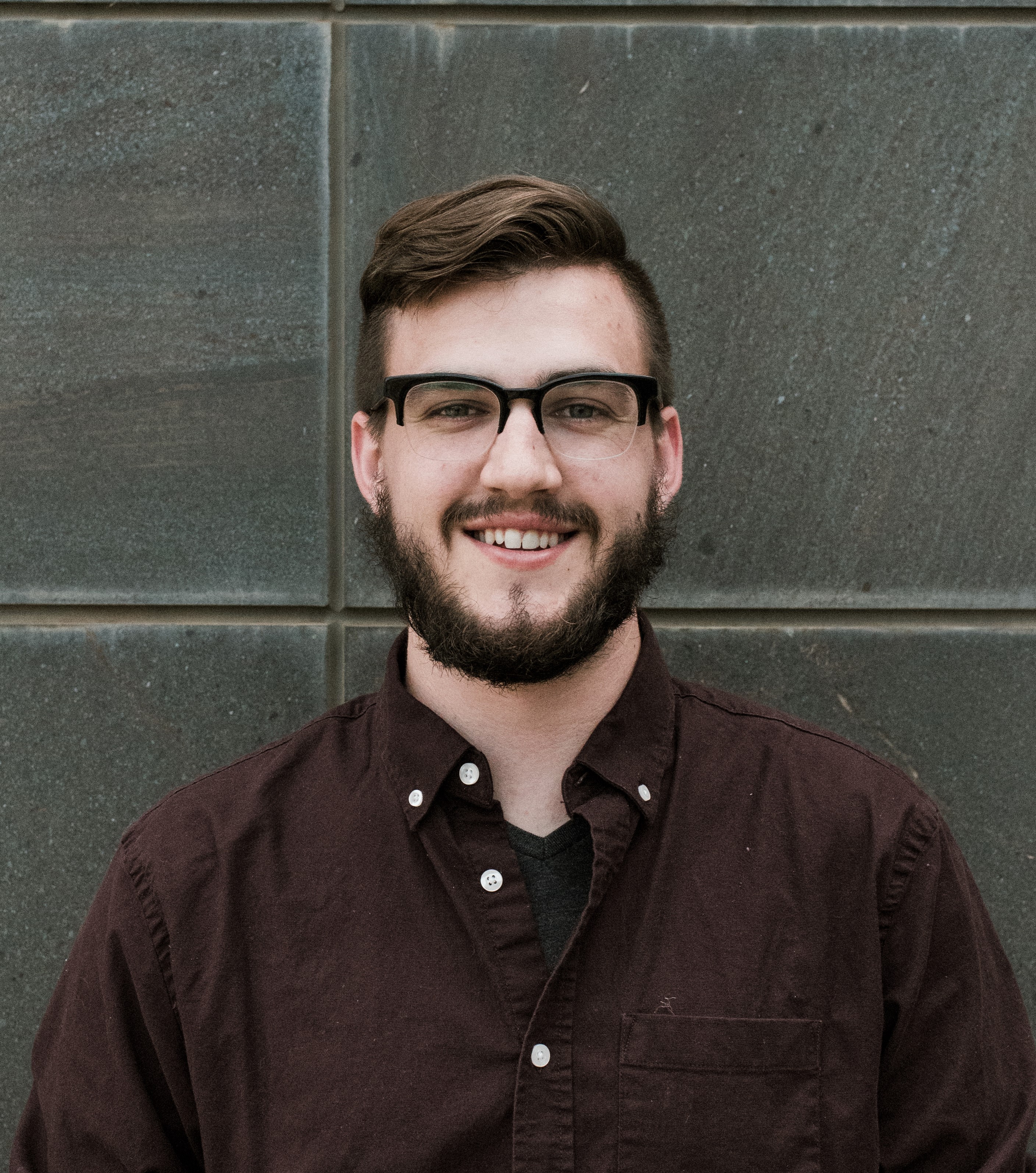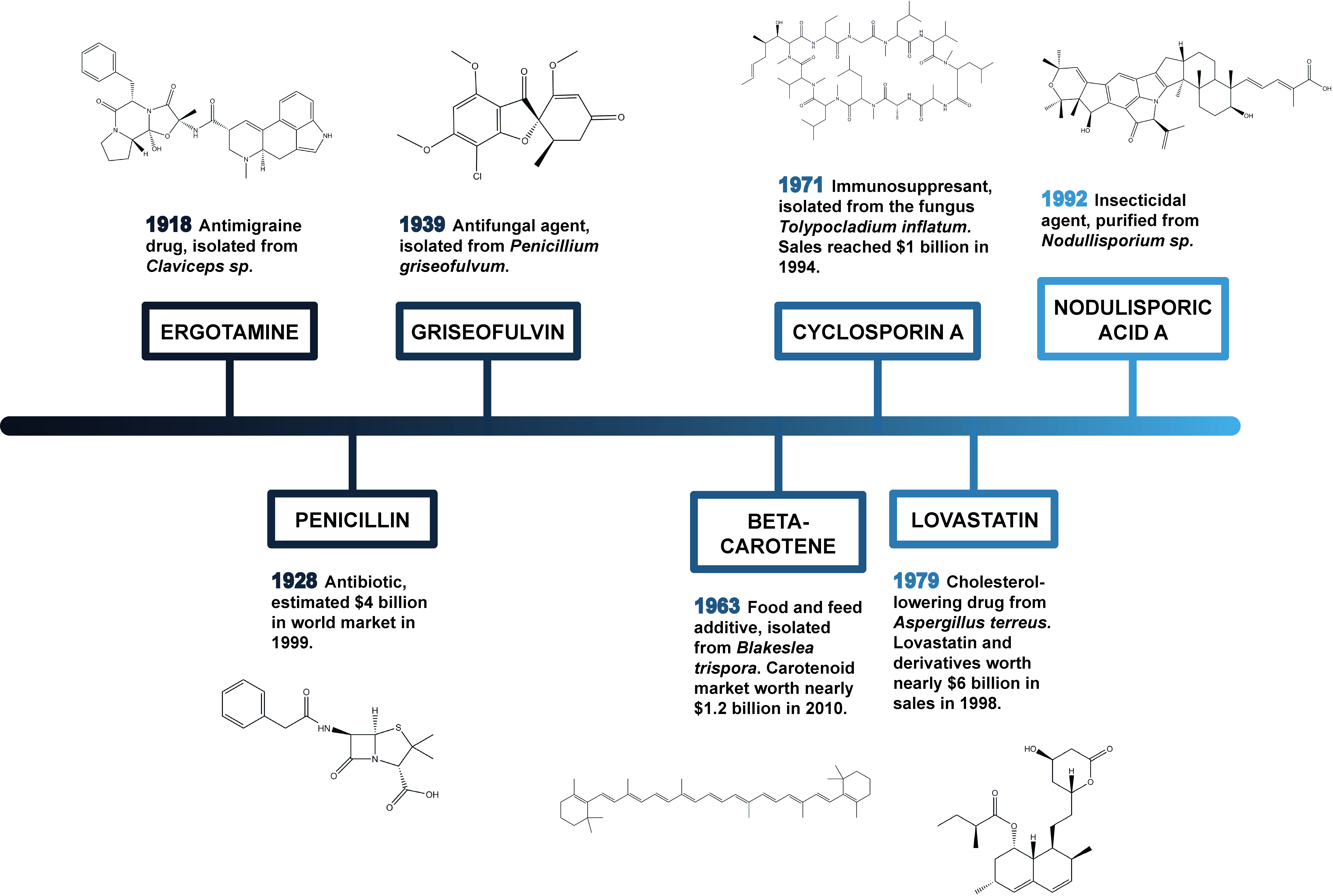
Ethan Hillman

Training Group:
Biotechnology
Mentor / Lab:
Dr. Kevin Solomon
Specific Research Area / Project:
Engineering Anaerobic Fungi for Production of Secondary Metabolites
Undergraduate Institution:
Anderson University (IN)
Lab / Personal work-related websites:
Lab WebsiteResearch Profile:
In recent years, we have begun facing the challenge of “Superbugs,” or antibiotic resistant organisms that are deadly when infections are not quickly treated. One of the main issues associated with this challenge is that organisms are becoming resistant to our medications more quickly than we are discovering new ones. Current projections estimate that by the year 2050, 10 million people each year will die each year from these superbugs; that’s more than the number of annual deaths due to cancer. Therefore, it is important that we find new sources of antibiotics and develop new strategies to fight these potentially deadly infections. A common source of these antimicrobial compounds is fungus; fungi leverage these secondary metabolites to outcompete other microorganisms in nature. As shown in the image below, fungal natural products represent a multi-billion-dollar industry that dates back to the early 20th century.
In the Solomon lab, I am evaluating the potential of an understudied group of fungi called the Neocallimastigomycota. These fungi live in the highly competitive intestinal tract of large herbivorous animals. Analysis of their genomes show a wealth of biosynthetic gene clusters (BGCs) that indicate their ability to create a large variety of compounds that are synthesized in ways similar to antibiotics. However, at this time, we lack the tools to manipulate these genes and validate their activity. For this reason, I am developing a set of molecular tools that will allow us to engineer these fungal genomes and, ultimately, these synthetic biology tools will allow us to control the expression of the BGCs for antibiotic and pharmaceutical purposes.

About Me:
When I began my undergraduate career, I was interested in joining the medical field as a physician. Once I was introduced to the lab research setting, however, I realized that I could have an equally impactful contribution to the medical field through my passion for biology and chemistry. My interests in microbiology introduced me to the concept of using microorganisms as miniature “chemical factories” that could produce a wide variety of compounds given the right genetic “wiring”. In addition to this concept, I became fascinated with the emerging understanding of the microbiome (the native community of microbes that continually live on and within us) and its effects on human health.
Over the past decade, the complexity of human-microbiome interactions has been a major focus of many research groups. Surprisingly, the microbiome has been found to have significant effects on immunity & disease susceptibility, hormonal balance, nutrition, and even behavior to name a few. When I came to Purdue, I decided that I wanted to pursue the challenge of merging these concepts: making native communities of “chemical factories” that could be exploited to improve health. The PULSe program has provided me exposure to several faculty and departments on campus that can provide me with the necessary tools and skills needed to acheive my goals. Because the PULSe program has faculty in many areas of life science research such as molecular microbiology, bioinformatics, and analytical chemistry, it not only allows me the opportunity to collaborate with experts on campus, but also to gain expertise in several interdisciplinary aspects myself.
Awards:
- NSF Graduate Research Fellowship Program – Honorable men??on in Engineering (Bioengineering) (2017)
- Stevenson Award – Anderson University (2015)
- STEM Scholarship – Great Lakes Higher Education Corporation (2011-2015)
- Undergraduate Scholarship – Indiana Space Grant Consortium (INSGC) (2013)
Publications:
- Hooker, C, Hillman, E. T., Overton, J. C., Ortiz-Velez, A. N., Schacht, M. L., Hunnicutt, A. L., Mosier, N., Solomon, K. V. (2018). Hydrolysis of untreated lignocellulosic feedstock is independent of S-lignin composition in newly classified anaerobic fungal isolate, Piromyces sp. UH3-1. Biotechnology for Biofuels, accepted.
- Hillman, E. T., Lu, H., Yao, T., & Nakatsu, C. H. (2017). Microbial ecology along the gastrointestinal tract. Microbes and environments, 32(4), 300-313.
- Hillman, E. T., Readnour, L. R., & Solomon, K. V. (2017). Exploiting the natural product potential of fungi with integrated-omics and synthetic biology approaches. Current Opinion in Systems Biology, 5, 50-56.
Presentations:
- Ethan Hillman, Logan Readnour, & Kevin V. Solomon (2018). Microbial enhanced oil recovery via in situ activation of native microbes with tailored nutrient formulations. Society for Industrial Microbiology and Biotechnology Annual Meeting, Chicago, IL. (Poster)
- Ethan Hillman, Adrian Ortiz-Velez, Casey Hooker, & Kevin V. Solomon (2018). Developing molecular tools to unlock the full potential of anaerobic fungi in biofuels and drug discovery. Central US Synthetic Biology Workshop, Northwestern University. (Poster)
- Ethan Hillman, Casey Hooker, Adrian Ortiz-Velez, & Kevin Solomon (2017). Advancing biofuel production and drug discovery through development of molecular tools: Unlocking the full potential of anaerobic fungi. Society for Industrial Microbiology and Biotechnology Annual Meeting, Denver, CO. (Poster)
- Ethan Hillman, Adrian Ortiz-Velez, Casey Hooker, & Kevin Solomon (2017). Optimized colony PCR rapidly profiles the extensive untapped biosynthetic potential for fuels and medicines in isolated anaerobic fungi. The Northeast and Midwest regions of the National Organization for the Professional Advancement of Black Chemists and Chemical Engineers (NOBCChE), University of Pittsburgh. (Invited oral presentation)
- Ethan Hillman, Casey Hooker, Adrian Ortiz-Velez, & Kevin V. Solomon (2017). Anaerobic Fungi: Regulating microbial environments in ruminant guts without antibiotics. 4th Agricultural and Biological Engineering Graduate Industrial Research Symposium, Purdue University. (Poster)
- Ethan Hillman, Adrian Ortiz-Velez, Casey Hooker, & Kevin Solomon (2017). Anaerobic fungi: Regula??ng microbial environments in ruminant guts without an??bio??cs. Purdue University Sigma Xi’s Graduate Student and Post-Doc Fellow Research Awards Competition, West Lafayette, IN. (poster)
- Ethan Hillman, Ryan Mote, Chad Wallace, & Scott Kennedy (2015). Functionalizing Fluorescent Proteins for the Detection of Explosive Materials in an Ultra-Sensitive Hydrogel-Based System. Alpha Chi Honor Society Research Conference, Chicago, IL. (Oral presentation)
- Ethan Hillman, Ryan Mote, Chad Wallace, & Scott Kennedy (2014). Functionalizing fluorescent proteins for detection of explosive compounds in hydrogels. Butler University Undergraduate Research Conference, Indianapolis, IN. (Oral Presentation)
Leadership:
- PULSe Student Government Organization - Vice President (‘18-present), Treasurer (‘16-‘18)
- Purdue Science in Schools – Elementary School Volunteer Instructor (‘15-present)
- Purdue Agribusiness Science Academy – Graduate Outreach Instructor (‘16-present)
- Purdue iGEM (International Genetically Engineered Machine) Competition team – Graduate Advisor (‘16-present)
- PULSe First-year Mentor (2016-present)
- Student Profiles
- Aktan Alpsoy
- Andrew Asberry
- Carlos A. Brito-Sierra
- Clairissa Corpstein
- Hao Chen
- Rachel Foguth
- Logan Ganzen
- Veronica Heintz
- Ethan Hillman
- Kathryn Jacobson
- Steven McKenzie
- Vinay Menon
- Jasmine Moore
- Alexandr Pak
- Raquel Peron
- Runrun Wu
- Sudhanshu Shekhar
- Janiel Ahkin Chin Tai
- Yu Tang
- Chelsea Theisen
- Samantha Tinsley
- Nicole Vike
- Ravi Yadav

